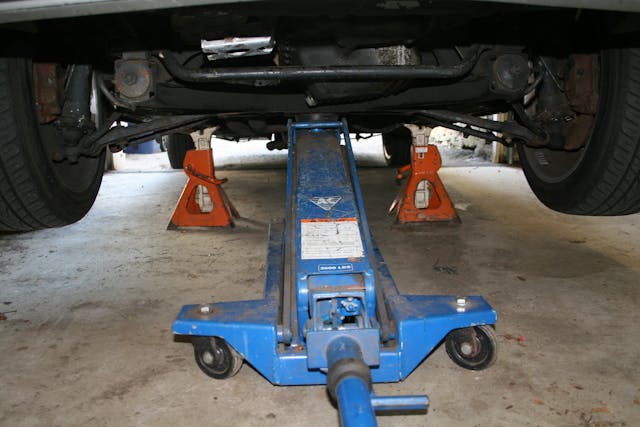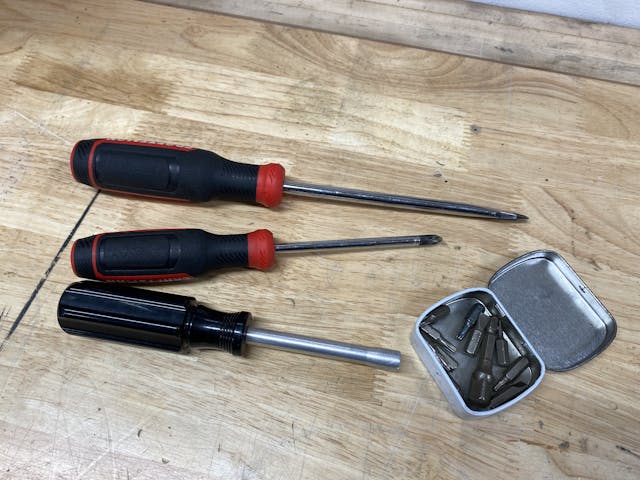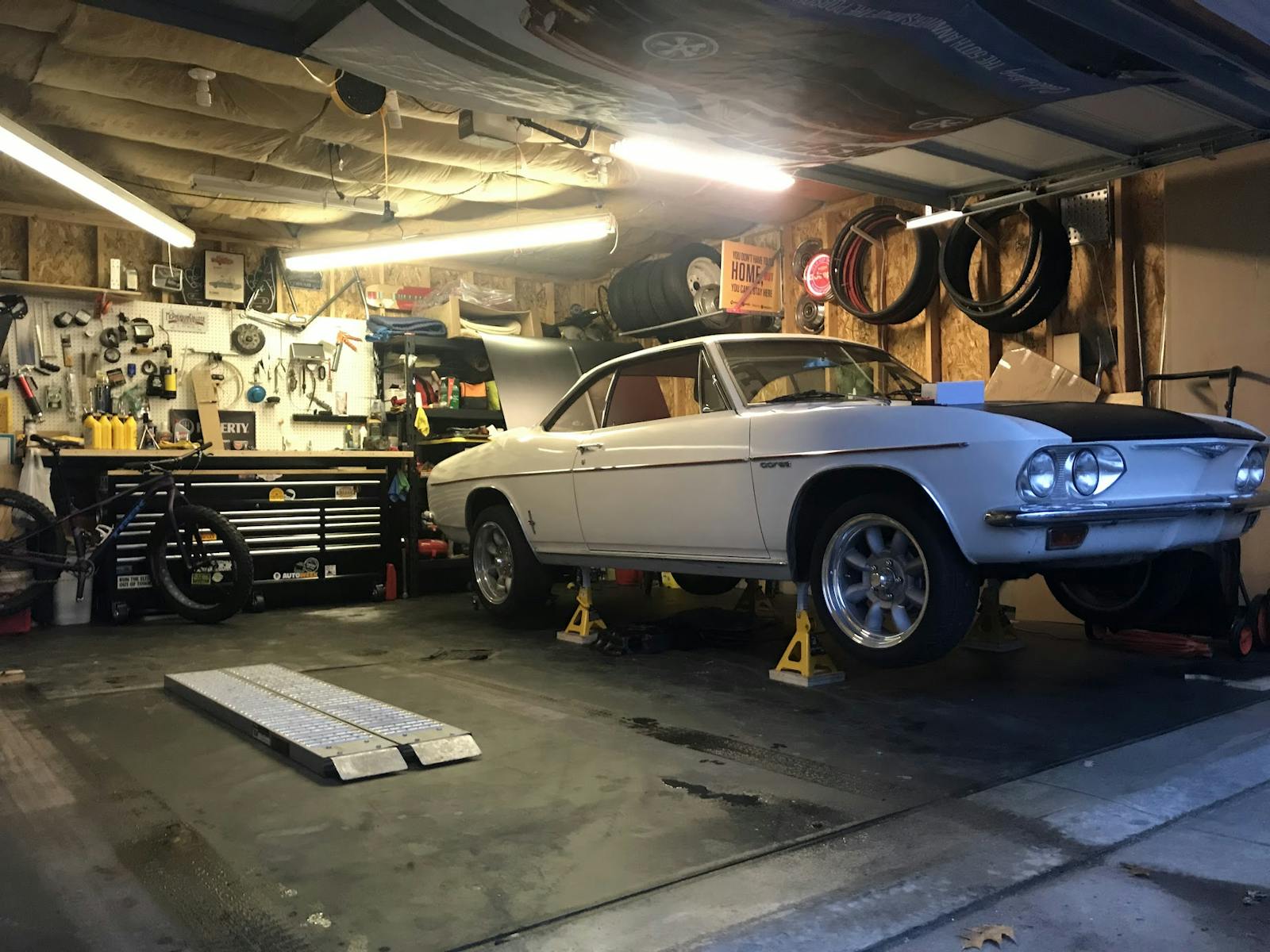Media | Articles
7 Tools You Basically Can’t DIY Without
I often think about the bare minimum number of tools required to do a job. Not the ideal tools. Maybe it comes from watching Saturday morning TV shows, where everything took 10 minutes and fit together flawlessly. Watching those projects take shape encouraged me to pick up tools and try my own. But what do you need to just get started?
If we waited until we had a full toolbox to dive in, none of us would ever get anything done. We’d just be sitting around staring at tools. Instead, let’s take a look at the tools that compose the minimum kit required to safely and successfully tackle a project on a daily driver—or at least allow you to do most of a job and then rent or borrow any specialty tools needed for to complete specific tasks. These don’t need to be fancy tools; in fact, this might be a list of items that are best purchased at garage sales, flea markets, or secondhand stores.
Jack and Stands

Sure, there are a lot of projects that do not require lifting a vehicle, but sooner or later you’ll need to do it. I’ve done oil changes by putting the front wheels on a curb to get enough clearance to roll under and access the drain plug and oil filter, but that practice doesn’t work in all situations. A jack and stands do. These are the right tools for every job that requires lifting a vehicle. That’s why they are something to get early in your wrenching journey.
Screwdrivers

Applied properly, screwdrivers have thousands of uses. We would never tell you to use them improperly, of course, but in a pinch a screwdriver can be used for all sorts of stuff that might very well render them one-time-only tools that, for better or for worse, will get the job done. Screwdrivers also can last a very long time if well taken care of, so adding these to your toolkit early will make for a solid base that rarely needs replacing, which leaves you with funds to buy more specialty tools to grow your kit—or you might just get through a handful of jobs without buying anymore tools at all. That’s a great feeling.
Socket Set

There is a reason every “mechanics toolset” sold in parts stores or home centers has sockets and ratchets as its main component. Ratchets and sockets are a highly efficient method of removing hardware without damaging it. A basic kit is enough to get started, and you can easily add bigger or longer pieces as needed.
Marketplace
Buy and sell classics with confidence
Hammer

You thought I wouldn’t include the hammer? It’s an inarguable necessity. Judicious use will make for a better wrenching experience, but when force is required, a mass at the end of a stick is just the right tool for the job.
Multimeter

“If you can’t fix it with a hammer it’s an electrical problem” is a good joke, because occasionally it’s based in fact. Electrical issues are more common than ever as cars feature more and more sensors and connections. To be a mechanic and not a parts replacer requires diagnostic tools, and diagnosing electrical issues is difficult to do consistently with only your eyes and hands. A good multimeter—and understanding how to read it—is vital.
Drain Pan

Want to do an oil change? You’ll need to catch the used oil somehow. Even a makeshift catch pan is good idea, but many of the drain pans designed for automotive projects are affordable and have features that seem trivial, until you are without them: A pour spout makes emptying the pan easier, and the ability to seal the fluids inside for transport is helpful, too. An open container of used oil is just waiting to be knocked over. Or it’s a magnet for tools or parts or worse, a spark. A good drain pan makes jobs cleaner and safer.
Penetrating Oil

Cars are built from a couple dozen different materials and the vast majority of them are susceptible to corrosion. Penetrating oil helps limit the need for big tools like impact drivers. Is an aerosol can technically a tool? Maybe not, but a good can of penetrating oil should be something you reach for before grabbing tools, so we are going to say it’s a critical part of the toolkit. Besides, if you’re limited on tools, you want to be able to stack the deck in your favor, and that means trying to break fasteners loose using science rather than force.
***
Check out the Hagerty Media homepage so you don’t miss a single story, or better yet, bookmark it. To get our best stories delivered right to your inbox, subscribe to our newsletters.








PB Baster makes for a great drilling & cutting fluid….
….RooDog….
The first tool I pick up is shop rag. This looks just like a PB ad, most pictures are of non branded tools, but the Blaster picks are obvious ads. Other penetrants work better.
Totally dumb, call CAA or whatever other options you have , go to your home and if that’s too far dump it at the nearest dealership and let them fix it” they have every tool”
Having experienced rag fires in the past I allow no rags in the shop. I use paper towels only and if anything has any solvents on them, they don’t go into a trash can, they go outside to dry or evaporate before discarding. I really hate it when I have a garage fire, so no rags.
A smart phone.
I take and save pictures before and during disassembly. I can magnify items in the picture. I check websites for information. I play music while I’m working. It has a built-in flashlight.
Worst case, I can call a pro to do the job.
The only essential tool is the one you don’t have when you need it.
3 things your body can’t live without: Air, Food, Water. Bask in my wisdom.
Been working on cars and trucks for 70 years and airplanes for 60 years. A couple of years ago I was exposed to a penetrating oil that outperforms anything you can buy. Mix 50 percent automatic transmission oil with 50 acetone. First time I used it I was trying to remove damaged exhaust manifold studs I could not budge them with any type of extractor and I was afraid I was going to twist them off. I took the bottom of a soft drink can put the mixture in it and suspended it where the stud was in the mixture. Went back a day later removed the can and spun the studs out with my fingers.
I think the thing that took me years to learn was ‘patience’. I have worked on a lot of things of my own and I learned to sometimes when things are not working right, coming apart and putting together it might be best to walk out of the shop/garage and close the door. Go do something else.
Bandaids.
REALLY useful are the ratcheting box end spanners. I paint them ORANGE for metric; BLUE for SAE… that way, you get to use BOTH when figuring out which they used on 1980s cars, where they were using BOTH on the same vehicle (grrrrrr)! Oh yeah… a deadfall hammer (lead shot filled)… Harbor Fright [sic] sells a good one that’s great, and is splendid for the “knock offs” (knock ONs in the UK) on my Austin-Healey 3000
Two things (probably already mentioned, but…) #1 – nitrile gloves that FIT. These days I would not do anything where possible contact with petroleum fluids might happen without nitrile gloves. I prefer big gloves that fit and go on my aging hands without having to be stretched much. I also prefer the heavy duty ones that don’t tear easily.
Second, I loved the singular form of many items… “socket set”. Yea, like any mechanic has only one. Likewise wrenches, hammers (many types for different applications), screwdrivers. Multiples. Multiples of sets. The one you need right now is the only one you don’t have. (worst is metric sockets that seem only to come in even number sets). I agree with vice grips and such.
A compressor is probably another “must have” tool, even if only for shop air to blow out stuff (carefully, of course). But tire inflation and the odd air tool or even that “on sale” paint sprayer will all benefit from a good compressor. I’ve gone for the oil-less ones in the pancake style for price and ease of use.
Otherwise excellent article.
Probably should include some wrenches. Box end and open end in metric and SAE!
Hard to do anything without these essentials. Add hydration as working hard and getting sweaty needs fluids replenished.
Can remember when used engine oil was collected at a depot, the oil trucks would spray the stuff on gravel roads to keep the dust down. Funny, the weeds grew, the grass grew, blackberry bushes and different small tress and the frogs, birds , bees, snakes and bugs all survived. No one thought anything of it. Now you’d end up with a hefty fine or jail time.